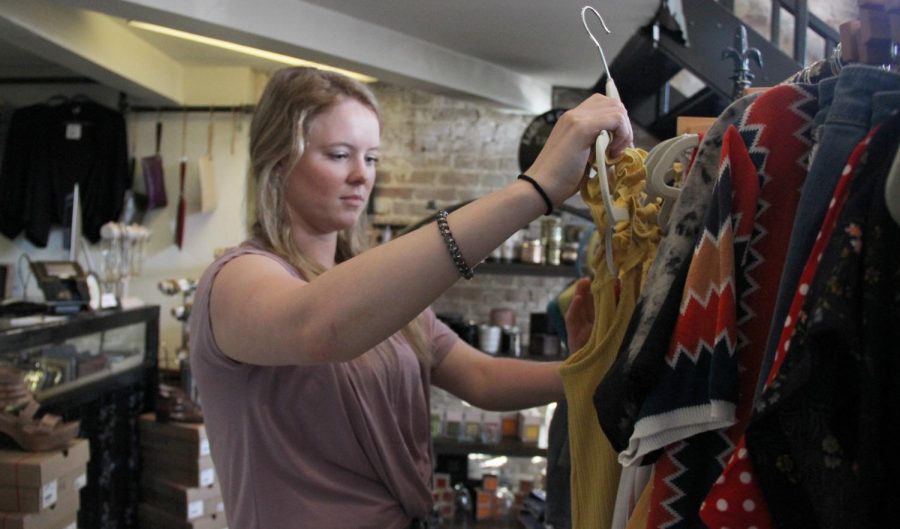Fashion enters STEM
Johnathan Zeringue/The Lion’s Roar
Sarah Cobb, an employee of Ruby, checks over the prices and values of the clothes. Fashion design uses a variety of STEM-related skills to enhance the field.
The fashion design industry is an ever-changing career field that goes hand in hand with many technological and science-related aspects.
Sarah Cobb, a freshman family and consumer sciences major, has experience with fashion and technology from working at the store Ruby.
“Fashion involves calculating the prices and using the computer to store information for percentages,” shared Cobb. “It is organizing the inventory, whether we have to order some more and measuring the European sizes to make sure the customers know exactly what they’re getting.”
Numerous institutions have begun offering fashion design as a STEM course in their curriculum.
According to US News and World Report, in 2015, Simon Hopkins, a senior at Park City High School in Utah, was responsible for leading one of the first six-week fashion design courses offered at Zaniac, a national STEM franchise. Since then, fashion design has been provided at all six Zaniac campuses and includes weekly 90-minute sessions.
Schools have added fashion design courses in order to increase the population of women in STEM-related fields.
The George Lucas Educational Foundation website stated that fashion design interests women of all backgrounds, and the field will gather more interest than traditional math and science.
Various fashion icons have also stressed the importance of STEM and fashion design, especially for women.
In an article by The Drum, Karlie Kloss, a fashion model and entrepreneur, recently partnered with the Ad Council’s “She Can Stem” campaign along with her non-profit organization, Kode With Klossy, to express to women that using STEM is essential to changing the world. On Pi Day, March 14, Kloss teamed up with a group of young scholars who were coding projects to help inspire self-confidence and creativity.
Sarah Clifton, an instructor of mathematics, believes that the method of incorporating fashion design in STEM may lead to future success.
“I think it is truly awesome that they’re looking at ways to increase women in STEM,” discussed Clifton. “I do think fashion design majors certainly can profit from taking courses in the STEM curriculum such as mathematics and computer animation. An understanding of geometry, counting principles, statistics and 3D graphics could be very helpful to future designers.”
Nishma Maskey, a junior computer science major and president of Women in Technology, highlighted why the blend of fashion design and STEM can ease the design process for fashion designers.
“In this 21st century, fashion designing is no longer limited to sewing materials and choosing color of threads,” said Maskey. “Fashion design is the unique mixture of creativity, art, science, technology and business. People in fashion deal with different kinds of magnetic fabric, laser cutters and custom developed thermoplastics, which are 3-D printed. Computers have also become a vital part of fashion designing as computer-aided design, or CAD, is the use of computer technology for the process of design and documentation.”
Offering fashion design courses is just one of the numerous techniques that can be used to draw more attention to STEM for women.
“Other ways to get women more interested are scholarships for female in STEM majors,” expressed Maskey. “Funding for organizations like WIT and ACM-W and support and encouragement programs with role models of the STEM field also helps as well.”
Your donation will support The Lion's Roar student journalists at Southeastern Louisiana University.
In addition, your contribution will allow us to cover our annual website hosting costs.
No gift is too small.






Brian Clair • Oct 10, 2020 at 3:49 am
The Science Museum I’ve heard about stem lecture from one of my acquaintances. This lecture is literally a lifetime opportunity for Science & Maths Students as it offers them to experience real science.